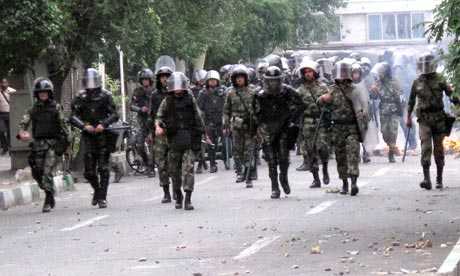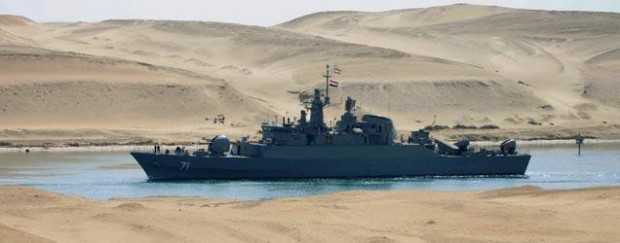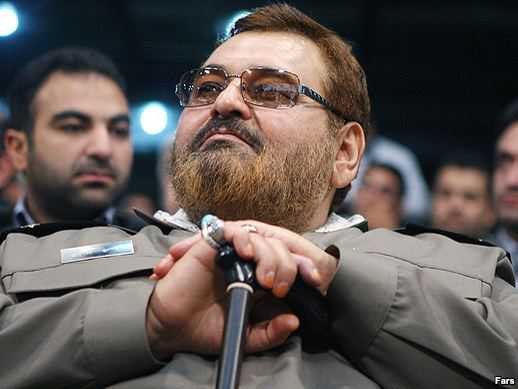It hardly looked like the embodiment of a quiet-neighborhood policy.
First Iran’s top military commander warned Azerbaijan’s president, Ilham Aliyev, in language that brooked no diplomacy that he faced a “grim fate” for betraying “Islamic principles.”
Then the head of an influential committee in Iran’s parliament announced that the de facto head of the militant Kurdistan Workers Party (PKK), Murat Karayilan — a man sought by Turkey for “terrorist” activities — had been captured by the Islamic Revolutionary Guards Corps in the Kandil Mountains.
Unsurprisingly, each story created a stir in the countries next door — before promptly being denied by Iran.
Major General Hassan Firuzabadi, head of Iran’s general staff, had not in fact declared that “the people’s awakening cannot be suppressed” or accused Aliyev’s government of “giv[ing] freedom to the Zionist regime [Israel] to meddle in [his] country’s affairs,” according to a statement issued by the Iranian Embassy in Baku. Nor had he accused Aliyev of giving “command to bar Islamic rules.”
Such quotes — despite their wide attribution — were the result of a “media misunderstanding,” the statement said.
So too, it seems, were reports carried by Iranian news agencies of Alaeddin Borujerdi, chairman of the Iranian parliament’s Foreign Affairs and Security Committee, announcing the arrest of Karayilan, widely seen as the PKK’s No. 2 figure behind Abdullah Ocalan, currently serving a life sentence in Turkey.
With the Turkish media in a frenzy and Turkey’s foreign minister, Ahmet Davutoglu, calling his Iranian counterpart Ali Akbar Salehi for clarification, Iran again backtracked. Borujerdi told Turkey’s ambassador to Tehran that he had been misquoted and had actually said that “it would be better had [Karayilan] been captured,” according to the Istanbul newspaper “Today’s Zaman.”
A Warning Shot?
So was it all just an unfortunate communication breakdown?
Not in the view of many Azerbaijani and Turkish observers, who believe it followed a well-trodden path of Iran’s Islamic regime playing diplomatic hardball. Nor did it wash with Azerbaijan’s government, whose relations with Tehran have long been tense.
Firuzabadi’s purported remarks prompted the Azerbaijani Foreign Ministry to deliver an official protest to the Iranian Embassy in Baku.
Then Azerbaijani police arrested three members of the banned Islamic Party of Azerbaijan (AIP), a radical group that Baku claims is funded by Tehran with the aim of creating instability.
The three — party Deputy Chairman Arif Qaniyev, Ramin Bayramov, the editor of an Islamist news site, and party member Abgul Suleymanov — were initially charged with illegal possession of weapons and drugs.
But in fact the arrests — and Firuzabadi’s comments — had a wider context. A joint statement from the Azerbaijani National Security Ministry and Prosecutor-General’s Office said they were also suspected of “hostile activity against Azerbaijan” — apparent code language for being in the pay of Iran.
Iran’s Islamist Front
Accusations by Azerbaijan of Iranian interference, voiced periodically since the Azeris’ independence from the Soviet Union in 1991, have intensified recently.
Baku has accused Tehran of being behind an increasing number of protests against Aliyev’s secular, Western-backed regime. These include demonstrations organized on Facebook in March and a rally staged outside the Education Ministry in December 2010 in response to the Azerbaijani ban on Islamic hijab in schools.
Islamic Party head Movsum Samadov called for Ilham Aliyev’s downfall.
Azerbaijan’s official nervousness led to the arrest earlier this year of the AIP’s leader, Movsum Samadov, who vehemently criticized the ban and then called on his website for Aliyev to be toppled.
Azerbaijani political analyst Arastun Orujlu says the latest arrests, unlike Samadov’s, are directly related to Iran’s actions and aimed at sending a signal to Tehran. While the Azerbaijani authorities “cannot arrest Firuzabadi,” they can arrest “those whom they consider to have close ties with Iran. By this way they also send a message to Iran.”
Vafa Gulzade, president of the Baku-based Caspian Policy Studies Foundation and a former Azerbaijani national-security adviser, believes Iran yearns for an Islamic republic to be established in Azerbaijan.
“After the collapse of the Soviet Union, Iran immediately began an aggressive policy against Azerbaijan,” Gulzade says. “First, it was an attempt to export the Islamic religion, Hizballah-style, to Azerbaijan. A lot of Iranians came to Azerbaijan and spent a lot of money and arranged cells of Hizballah in the whole territory of Azerbaijan. Iran is continuing this job, to create in Azerbaijan cells and to support groups of Azerbaijanis for Iranian groups.”
Sharing Suspicions
Baku’s suspicions are fueled by the strong ethnic, religious, and cultural links between Azerbaijan and Iran. The modern Azerbaijani state was once part of Iran before being annexed by Russia in the 19th century. Nearly nine out of 10 Azeris share Iran’s official Shi’ite Islamic faith. And most tellingly, Azeri — a language close to Turkish — is spoken by around a quarter of Iran’s population, mainly in the northern provinces bordering Azerbaijan.
Yet these common bonds mean the suspicion cuts both ways. Iran feels threatened by Azerbaijan’s close alliance with Tehran’s two arch-enemies, the United States and Israel, and with NATO. Azerbaijan provides around 20 percent of Israel’s oil supplies while Baku recently purchased Israeli weapons worth an estimated $300 million.
For Tehran, such links provide its Western foes with the perfect launching pad to foment division within its own population.
As the Texas-based think tank Stratfor noted in March: “Tehran…is concerned about Baku’s use of its links to certain parts of Iran’s ethnic Azerbaijani population to sow discord within Iran and serve as a launching point for the West into Iran. Tehran most recently accused Baku of such actions in the Green Movement’s failed attempt at revolution in 2009. Geopolitically, the two countries’ strategic interests often clash. Iran has strong ties with Armenia (Azerbaijan’s foe), while Azerbaijan has good relations with the West, and political and military ties to Israel — both of which are uncomfortable for Iran.”
Israel’s Shimon Peres visits Baku — and makes Tehran nervous.
The idea that Israel could use the Azerbaijanis as a potential fifth column against Iran echoes a similar suspicion voiced in the past about Israeli infiltration of the Kurdish populations in Iran and Iraq. Indeed, senior officials with Israel’s foreign intelligence agency, Mossad, have spoken openly of having a presence in Iran’s Kurdish areas.
The truth of this, according to Meir Javedanfar, an Iranian-born political commentator with Israeli citizenship, is hard to establish. “According to reports in the Israeli press, Israeli military training and communication companies were active in Kurdistan a number of years ago but whether they or the Mossad continue to be there is unclear,” he told RFE/RL in an e-mail.
“Iraq as a whole is an area of interest for the state of Israel, because of its importance to the Arab world, Iran, and the United States. It would be natural and logical for Israel to want to have influence there,” Javedanfar continued. “Whether it can is another question. With Israel’s increasing diplomatic isolation, more countries in the Middle East are moving away than toward Israel under [Israeli Prime Minister Binyamin] Netanyahu.”
Iran: ‘The Kurds For Syria’
But according to Sadraddin Soltan, a Baku-based analyst on Iranian affairs, Tehran is pressuring Azerbaijan to send a signal to Baku’s more powerful ally, Turkey, over one of Iran’s key foreign-policy preoccupations, Syria. The Turkish government of Recep Tayyip Erdogan has, along with the United States, bitterly criticized the brutal suppression by Syrian President Bashar al-Assad — Iran’s close friend — of mass protests against his rule.
“Tehran is irritated by all these developments. Iran is closely following NATO-Azerbaijan, U.S.-Azerbaijani ties,” Soltan says. “Through Firuzabadi’s statements, Iran is exerting pressure on Turkey and the U.S. [and sending the message] that it can create obstacles to their ally Azerbaijan, just as they [the Turks] press the Syrian regime.”
The same belief has gained ground in Turkey to explain Iran’s recent behavior over the recent phantom PKK arrest. The claim followed reports of recent Iranian incursions into Iraq to root out members of the Party for a Free Life in Kurdistan (PJAK), a militant Iranian-Kurdish group (allied to the PKK) that had been mounting an effective sabotage campaign.
Even more pertinently, according to Turkish commentators, is that it preceded an anticipated offensive by Turkey in the coming weeks against PKK strongholds. Intelligence cooperation against Kurdish militants has been part of a general rapprochement between Ankara and Tehran in recent years. Knowing Turkish intentions to act against the PKK, some believe, Iran saw its chance to indulge in some underhand diplomacy.
“Iran is sending a message to Turkey,” wrote Markar Esayan in “Today’s Zaman.” “A message saying it is willing to take action against the PKK in return for concessions by Turkey regarding the Syrian issue. To Turkey [the message is] you have a dominant role in the uprisings in Syria, which is an indispensible ally to us in the region. If you give up on Syria, we will deal with the PKK together; otherwise, we will become allies with the PKK.”
RFE/RL’s Azerbaijani Service contributed to this report from Baku






